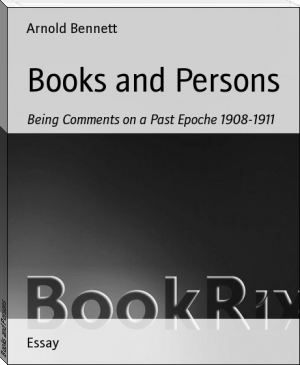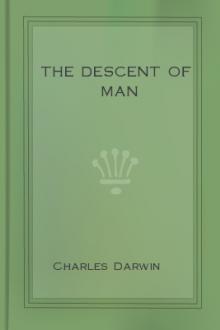Books and Persons - Arnold Bennett (phonics readers .TXT) 📗

- Author: Arnold Bennett
Book online «Books and Persons - Arnold Bennett (phonics readers .TXT) 📗». Author Arnold Bennett
the Tory point of view) that he did not remain a literary critic. I am convinced that Mr. Balfour and Lord Lansdowne would personally subscribe large sums to found a literary paper for him to edit, on condition that he promised never to write another line of advice to their party. The _Telegraph_ would bleed copiously; the _Observer_ would expire; the _Fortnightly Review_ would stagger in its heavy stride, but there would be hope for Tories!... In the meantime, five thousand copies of the English translation of "Marie Claire" were sold within a week of publication. It is improbable that the total English sale will be less than ten thousand. Now translated novels rarely achieve popularity. The last one to be popular here was Fogazzaro's "The Saint"; but the popularity of "The Saint" was not due to artistic causes.
* * * * *
I think I may say that I am thoroughly accustomed to the society of women novelists. Peculiar circumstances in my obscure life have thrown me among women writers of all sorts; and I can boast that I have helped to form more than one woman novelist; so that the prospect of meeting a new one does not agitate me in the slightest degree. I make friends with the new one at once, and in about two minutes we are discussing prices with the most touching familiarity. Nevertheless, I own that I was somewhat disturbed in my Midland phlegm when the author of "Marie Claire" came to see me. The book, read in the light of the circumstances of its composition, had unusually impressed me and stirred my imagination. It was not the woman novelist who was coming to see me, but Marie Claire herself, shepherdess, farm-servant, and sempstress; it was a mysterious creature who had known how to excite enthusiasm in a whole regiment of literary young men.... And literary young men as a rule are extremely harsh, even offensive, in their attitude towards women writers. I stood at the top of the toy stairs of the _pavillon_ which I was then occupying in Paris, and Madame Marguerite Audoux came up the stairs towards me, preceded by one of her young sponsors, and followed by another. A rather short, plump little lady, very simply dressed, and with the simplest possible manner--just such a comfortable human being as in my part of the world is called a "body"! She had, however, eyes of a softness and depth such as are not seen in my part of the world. With that, a very quiet, timid, and sweet voice. She was a sempstress; she looked like a sempstress; and she was well content to look like a sempstress. Nobody would have guessed in ten thousand guesses that here was the author of the European book of the year. But when she talked the resemblance to the sempstress soon vanished. Sempstresses--of whom I have also known many--do not talk as she talked. Not that she said much! Not that she began to talk at once! Far from it. When I had referred to the goodness of her visit, and she had referred to the goodness of my invitation, and she was ensconced in an arm-chair near the fire, she quite simply left the pioneer work of conversation to her bodyguard. Her bodyguard was very proud, and very nervous, as befitted its age.
* * * * *
It was my reference to Dostoievsky that first started her talking. In all literary conversations Dostoievsky is my King Charles's head. She had previously stated that she had read very little indeed. But at any rate she had read Dostoievsky, and was well minded to share my enthusiasms. Indeed, Dostoievsky drew her out of her arm-chair and right across the room. We were soon discussing methods of work, and I learnt that she worked very slowly indeed, destroying much, and feeling her way inch by inch rather than seeing it clear ahead. She said that her second book, dealing with her life in Paris, might not be ready for years. It was evident that she profoundly understood the nature of work--all sorts of work. Work had, indeed, left its honourable and fine mark upon her. She made some very subtle observations about the psychology of it, but unfortunately I cannot adequately report them here.... From work to prices, naturally! It was pleasing to find that she had a very sane and proper curiosity as to prices and conditions in England. After I had somewhat satisfied this curiosity she showed an equally sane and proper annoyance at the fact that the English and American rights of "Marie Claire" had been sold outright for a ridiculous sum. She told me the exact sum. It was either L16 or L20--I forget which.
* * * * *
When Madame Audoux had gone I reviewed my notions of her visit, and I came to the conclusion that she was very like her book. She had said little, and nothing that was striking, but she had mysteriously emanated an atmosphere of artistic distinction. She was a true sensitive. She had had immense and deep experience of life, but her adventures, often difficult, had not disturbed the nice balance of her judgment, nor impaired the delicacy of her impressions. She was an amateur of life. She was awake to all aspects of it. And a calm common sense presided over her magnanimous verdicts. She was far too wary, sagacious, and well acquainted with real values to allow herself to be spoilt, even the least bit, by a perilous success, however brilliant. Such were my notions. But it is not in a single interview that one can arrive at a due estimate of a mind so reserved, dreamy, and complex as hers. The next day she left Paris, and I have not seen her since.
JOHN MASEFIELD
[_20 April '11_]
I opened Mr. John Masefield's novel of modern London, "The Street of To-day" (Dent and Co.), with much interest. But I found it very difficult to read. This is a damning criticism; but what would you have? I found it very difficult to read. It is very earnest, very sincere, very carefully and generously done. But these qualities will not save it. Even its intelligence, and its alert critical attitude towards life, will not save it. I could say a great deal of good about it, and yet all that I could say in its favour would not avail. It would certainly be better if it were considerably shorter. I estimate that between fifty and a hundred pages of small talk and miscellaneous observation could be safely removed from it without impairing the coherence of the story. The amount of small talk recorded is simply terrific. Not bad small talk! Heard in real life, it would be reckoned rather good small talk! But artistically futile! Small talk, and cleverer small talk than this, smothered and ruined a novel more dramatic than this--I mean Mr. Zangwill's "The Master." I am convinced that a novel ought to be dramatic--intellectually, spiritually, or physically--and "The Street of To-day" is not dramatic. It is always about to be dramatic and it never is. Chapter III, for instance, contains very important material, essential to the tale, fundamental. But it is not presented dramatically. It is presented in the form of a psychological essay. Now Mr. Masefield's business as a novelist was to have invented happenings for the presentment of the information contained in this essay. He has saved himself a lot of trouble, but to my mind he has not yet come to understand what a novel is.
* * * * *
His creative power is not yet mature. That is to say, he does not convince the reader in the measure which one would expect from a writer of his undoubted emotional faculty. And yet he is often guilty of carelessness in corroborative detail--such carelessness as only a mighty tyrant over the reader could afford. The story deals largely with journalism. And one of the papers most frequently mentioned is "The Backwash." Now no paper could possibly be called "The Backwash." It is conceivable that a paper might be called "The Tip Top." It is just conceivable that a paper might be called "Snip Snap." But "The Backwash," never! Mr. Masefield knows this as well as anybody. The aim of his nomenclature was obviously satiric--an old dodge which did very well in the loose Victorian days, but which is excruciatingly out of place in a modern strictly realistic novel. A trifle, you say! Not at all! Every time "The Backwash" is mentioned, the reader thinks: "No paper called 'The Backwash' ever existed." And a fresh break is made in Mr. Masefield's convincingness. A modern novelist may not permit himself these freakish negligences. Another instance of the same fault is the Christian name of Mrs. Bailey in "The New Machiavelli." It was immensely clever of Mr. Wells to christen her "Altiora." But in so doing he marred the extraordinary brilliance of his picture of her. If you insist that I am talking about trifles, I can only insist that a work of art is a series of trifles.
* * * * *
Mr. Masefield's style suffers in a singular manner. It is elaborate in workmanship--perhaps to the point of an excessive self-consciousness. But its virtue is constantly being undermined by inexactitudes which irritate and produce doubt. For example:
"They entered the tube station. In the train they could not talk much. Lionel kept his brain alert with surmise as to the character of the passengers. Like Blake, a century before, he found 'marks of weakness, marks of woe,' on each face there." Blake in the tube! Mr. Masefield will produce a much better novel than "The Street of To-day."
LECTURES AND STATE PERFORMANCES
[_25 May '11_]
Driven by curiosity I went to hear Mr. H.G. Wells's lecture last Thursday at the _Times_ Book Club on "The Scope of the Novel." Despite the physical conditions of heat, and noise, and an open window exactly behind the lecturer (whose voice thus flowed just as much into a back street as into the ears of his auditors), the affair was a success, and it is to be hoped that the _Times_ Book Club will pursue the enterprise further. It was indeed a remarkable phenomenon: a first-class artist speaking the truth about fiction to a crowd of circulating-library subscribers! Mr. Wells was above all defiant; he contrived to put in some very plain speaking about Thackeray, and he finished by asserting that it was futile for the fashionable public to murmur against the intellectual demands of the best modern fiction--there was going to be no change unless it might be a change in the direction of the more severe, the more candid, and the more exhaustively curious.
*
* * * * *
I think I may say that I am thoroughly accustomed to the society of women novelists. Peculiar circumstances in my obscure life have thrown me among women writers of all sorts; and I can boast that I have helped to form more than one woman novelist; so that the prospect of meeting a new one does not agitate me in the slightest degree. I make friends with the new one at once, and in about two minutes we are discussing prices with the most touching familiarity. Nevertheless, I own that I was somewhat disturbed in my Midland phlegm when the author of "Marie Claire" came to see me. The book, read in the light of the circumstances of its composition, had unusually impressed me and stirred my imagination. It was not the woman novelist who was coming to see me, but Marie Claire herself, shepherdess, farm-servant, and sempstress; it was a mysterious creature who had known how to excite enthusiasm in a whole regiment of literary young men.... And literary young men as a rule are extremely harsh, even offensive, in their attitude towards women writers. I stood at the top of the toy stairs of the _pavillon_ which I was then occupying in Paris, and Madame Marguerite Audoux came up the stairs towards me, preceded by one of her young sponsors, and followed by another. A rather short, plump little lady, very simply dressed, and with the simplest possible manner--just such a comfortable human being as in my part of the world is called a "body"! She had, however, eyes of a softness and depth such as are not seen in my part of the world. With that, a very quiet, timid, and sweet voice. She was a sempstress; she looked like a sempstress; and she was well content to look like a sempstress. Nobody would have guessed in ten thousand guesses that here was the author of the European book of the year. But when she talked the resemblance to the sempstress soon vanished. Sempstresses--of whom I have also known many--do not talk as she talked. Not that she said much! Not that she began to talk at once! Far from it. When I had referred to the goodness of her visit, and she had referred to the goodness of my invitation, and she was ensconced in an arm-chair near the fire, she quite simply left the pioneer work of conversation to her bodyguard. Her bodyguard was very proud, and very nervous, as befitted its age.
* * * * *
It was my reference to Dostoievsky that first started her talking. In all literary conversations Dostoievsky is my King Charles's head. She had previously stated that she had read very little indeed. But at any rate she had read Dostoievsky, and was well minded to share my enthusiasms. Indeed, Dostoievsky drew her out of her arm-chair and right across the room. We were soon discussing methods of work, and I learnt that she worked very slowly indeed, destroying much, and feeling her way inch by inch rather than seeing it clear ahead. She said that her second book, dealing with her life in Paris, might not be ready for years. It was evident that she profoundly understood the nature of work--all sorts of work. Work had, indeed, left its honourable and fine mark upon her. She made some very subtle observations about the psychology of it, but unfortunately I cannot adequately report them here.... From work to prices, naturally! It was pleasing to find that she had a very sane and proper curiosity as to prices and conditions in England. After I had somewhat satisfied this curiosity she showed an equally sane and proper annoyance at the fact that the English and American rights of "Marie Claire" had been sold outright for a ridiculous sum. She told me the exact sum. It was either L16 or L20--I forget which.
* * * * *
When Madame Audoux had gone I reviewed my notions of her visit, and I came to the conclusion that she was very like her book. She had said little, and nothing that was striking, but she had mysteriously emanated an atmosphere of artistic distinction. She was a true sensitive. She had had immense and deep experience of life, but her adventures, often difficult, had not disturbed the nice balance of her judgment, nor impaired the delicacy of her impressions. She was an amateur of life. She was awake to all aspects of it. And a calm common sense presided over her magnanimous verdicts. She was far too wary, sagacious, and well acquainted with real values to allow herself to be spoilt, even the least bit, by a perilous success, however brilliant. Such were my notions. But it is not in a single interview that one can arrive at a due estimate of a mind so reserved, dreamy, and complex as hers. The next day she left Paris, and I have not seen her since.
JOHN MASEFIELD
[_20 April '11_]
I opened Mr. John Masefield's novel of modern London, "The Street of To-day" (Dent and Co.), with much interest. But I found it very difficult to read. This is a damning criticism; but what would you have? I found it very difficult to read. It is very earnest, very sincere, very carefully and generously done. But these qualities will not save it. Even its intelligence, and its alert critical attitude towards life, will not save it. I could say a great deal of good about it, and yet all that I could say in its favour would not avail. It would certainly be better if it were considerably shorter. I estimate that between fifty and a hundred pages of small talk and miscellaneous observation could be safely removed from it without impairing the coherence of the story. The amount of small talk recorded is simply terrific. Not bad small talk! Heard in real life, it would be reckoned rather good small talk! But artistically futile! Small talk, and cleverer small talk than this, smothered and ruined a novel more dramatic than this--I mean Mr. Zangwill's "The Master." I am convinced that a novel ought to be dramatic--intellectually, spiritually, or physically--and "The Street of To-day" is not dramatic. It is always about to be dramatic and it never is. Chapter III, for instance, contains very important material, essential to the tale, fundamental. But it is not presented dramatically. It is presented in the form of a psychological essay. Now Mr. Masefield's business as a novelist was to have invented happenings for the presentment of the information contained in this essay. He has saved himself a lot of trouble, but to my mind he has not yet come to understand what a novel is.
* * * * *
His creative power is not yet mature. That is to say, he does not convince the reader in the measure which one would expect from a writer of his undoubted emotional faculty. And yet he is often guilty of carelessness in corroborative detail--such carelessness as only a mighty tyrant over the reader could afford. The story deals largely with journalism. And one of the papers most frequently mentioned is "The Backwash." Now no paper could possibly be called "The Backwash." It is conceivable that a paper might be called "The Tip Top." It is just conceivable that a paper might be called "Snip Snap." But "The Backwash," never! Mr. Masefield knows this as well as anybody. The aim of his nomenclature was obviously satiric--an old dodge which did very well in the loose Victorian days, but which is excruciatingly out of place in a modern strictly realistic novel. A trifle, you say! Not at all! Every time "The Backwash" is mentioned, the reader thinks: "No paper called 'The Backwash' ever existed." And a fresh break is made in Mr. Masefield's convincingness. A modern novelist may not permit himself these freakish negligences. Another instance of the same fault is the Christian name of Mrs. Bailey in "The New Machiavelli." It was immensely clever of Mr. Wells to christen her "Altiora." But in so doing he marred the extraordinary brilliance of his picture of her. If you insist that I am talking about trifles, I can only insist that a work of art is a series of trifles.
* * * * *
Mr. Masefield's style suffers in a singular manner. It is elaborate in workmanship--perhaps to the point of an excessive self-consciousness. But its virtue is constantly being undermined by inexactitudes which irritate and produce doubt. For example:
"They entered the tube station. In the train they could not talk much. Lionel kept his brain alert with surmise as to the character of the passengers. Like Blake, a century before, he found 'marks of weakness, marks of woe,' on each face there." Blake in the tube! Mr. Masefield will produce a much better novel than "The Street of To-day."
LECTURES AND STATE PERFORMANCES
[_25 May '11_]
Driven by curiosity I went to hear Mr. H.G. Wells's lecture last Thursday at the _Times_ Book Club on "The Scope of the Novel." Despite the physical conditions of heat, and noise, and an open window exactly behind the lecturer (whose voice thus flowed just as much into a back street as into the ears of his auditors), the affair was a success, and it is to be hoped that the _Times_ Book Club will pursue the enterprise further. It was indeed a remarkable phenomenon: a first-class artist speaking the truth about fiction to a crowd of circulating-library subscribers! Mr. Wells was above all defiant; he contrived to put in some very plain speaking about Thackeray, and he finished by asserting that it was futile for the fashionable public to murmur against the intellectual demands of the best modern fiction--there was going to be no change unless it might be a change in the direction of the more severe, the more candid, and the more exhaustively curious.
*
Free e-book «Books and Persons - Arnold Bennett (phonics readers .TXT) 📗» - read online now
Similar e-books:





Comments (0)